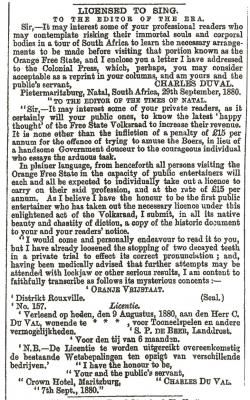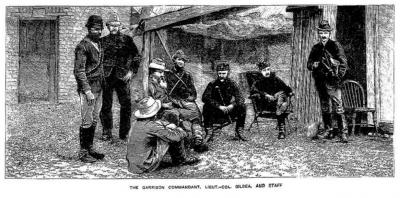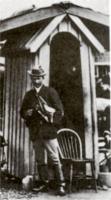
Charles Allen Du Val
His life and works
Alone In South Africa
The Great Entertainer in South Africa was alone with his team after his wife Minnie had returned to England. Charles Henry Du Val continued journeying with his party, as he described by in vivid detail in his book and press reports (1).
His unfailing sense of humour - not to mention his bureaucratic tribulations - may be illustrated by the letters that he wrote to the editors of a London publication catering for the theatrical profession and also a local South African newspaper, duly published in London on 14 November 1880:.

The Era London Sunday 14 November 1880
"LICENSED TO SING.
TO THE EDITOR OF THE ERA
Sir,—It may interest some of your professional readers who may contemplate risking their immortal souls and corporal bodies in a tour of South Africa to learn the necessary arrangements to be made before visiting that portion known as the Orange Free State, and I enclose you a letter I have addressed to the Colonial Press, which, perhaps, you may consider acceptable as a reprint in your columns,
and am yours and the public's servant,
CHARLES DU VAL.
Pietermaritzbnrg, Natal, South Africa, 29th September, 1880.
" TO THE EDITOR OF THE TIMES OF NATAL
"Sir,—It may interest some of your private readers, as it certainly will your public ones, to know the latest 'happy thought' of the Free State Volksraad to increase their revenue. It is none other than the infliction of a penalty of £15 per annum for the offence of trying to amuse the Boers, in lieu of a handsome Government douceur to the courageous individual who essays the arduous task.
In plainer language, from henceforth all persons visiting the Orange Free State in the capacity of public entertainers will each and all be expected to individually take out a licence to carry on their said profession, and at the rate of £15 per annum. As I believe I have the honour to be the first public entertainer who has taken out the necessary licence under this enlightened act of the Volksraad, I submit, in all its native beauty and chastity of diction, a copy of the historic document to your and your readers' notice.
"I would come and personally endeavour to read it to you, but I have already loosened the stopping of two decayed teeth in a private trial to effect its correct pronunciation ; and, having been medically advised that further attempts may be attended with lockjaw or other serious results, I am content to faithfully transcribe as follows its mysterious contents — " (2).
On 18 November 1880 he reached Pretoria, capital of annexed Transvaal. Emigrants, especially from Ireland, had been encouraged to settle there. Charley was furious at the conditions that awaited them. Most of the land still available was infested with malaria mosquitoes. Horse-sickness and other unfamiliar diseases were endemic. False prospectuses tempted emigrants into supposed mining wealth, but failed to mention that the mineral discoveries were tiny and also that there were no railways to take them to the coast. The nearest safe port, Durban, was over four hundred miles across terrible terrain that Charley had encountered on his travels, “in cases of wet weather suffering hardships and delays to which the worst European journey was comfort itself”.
Furthermore, “looming upon the horizon of the 'land of milk and honey’ there was the stalwart figure of the Dutch Boer, who had as little affection for the British immigrant as he had for the British Government, regarding the former as an interloper and the latter as a usurper”. Although not the first white men there, the Boers had been the first to settle permanently in the Transvaal. Charley was increasingly certain that they would fight to take back the Transvaal, and he was soon proved right. He urged the complacent Administrator to act. “Your Excellency,” he protested, “they have been the pioneers of South Africa and have fought their way from the shores of Table Bay to the Zambesi”. “Yes, I grant you that”, came the reply, “but they had only Kaffirs to deal with. They will never stand against the red-coats”.

Charles Henry Du Val is on the extreme right
Nevertheless a small volunteer defence force was organised. Charley joined it and went out on patrol. On 14 December Charley gave a performance of his show to the soldiers, believing they would soon have other duties on their minds.
Even as his audience applauded wildly, Charley thought of the ring of soldiers around the town. At the end of the first half, he noticed a private note being passed to the Colonel. Backstage he was waiting for Charley with the message “There is war!”
On 18 December the last mailcart arrived in Pretoria, and thereafter the Boers laid siege to the town (3). Pretoria itself was almost impossible to defend. It was abandoned, and the inhabitants were moved into the military camp. Charley’s horses were commandeered, but he managed to get his baggage to the military canteen into the safe keeping of a trusty sergeant-major. His offer to serve as war correspondent was accepted, and he quickly moved his wagon into battle headquarters before it too could be commandeered.
On Christmas Day 1880 the first edition of one of the strangest newspapers ever seen was published. The printing press of the local newspaper had been brought into the camp, and ((Charles Henry Du Val|Charley}} persuaded editor Charles Deecker to let him produce a newspaper.
So was born the News of the Camp.
(1) Information on the travels of Charles Henry Du Val in South Africa is from his own book With a Show through Southern Africa and Personal Reminiscences of the Transvaal War. Information has also been added from reliable contemporary newspaper cuttings.
(2) The Era London Sunday 14 November 1880.
(3) A detailed report on the Siege of Pretoria was published in London in The Graphic Saturday 28 May 1881.
For a collection of the press reports on Charles Henry Du Val see Charles Henry Du Val Press Cuttings.

